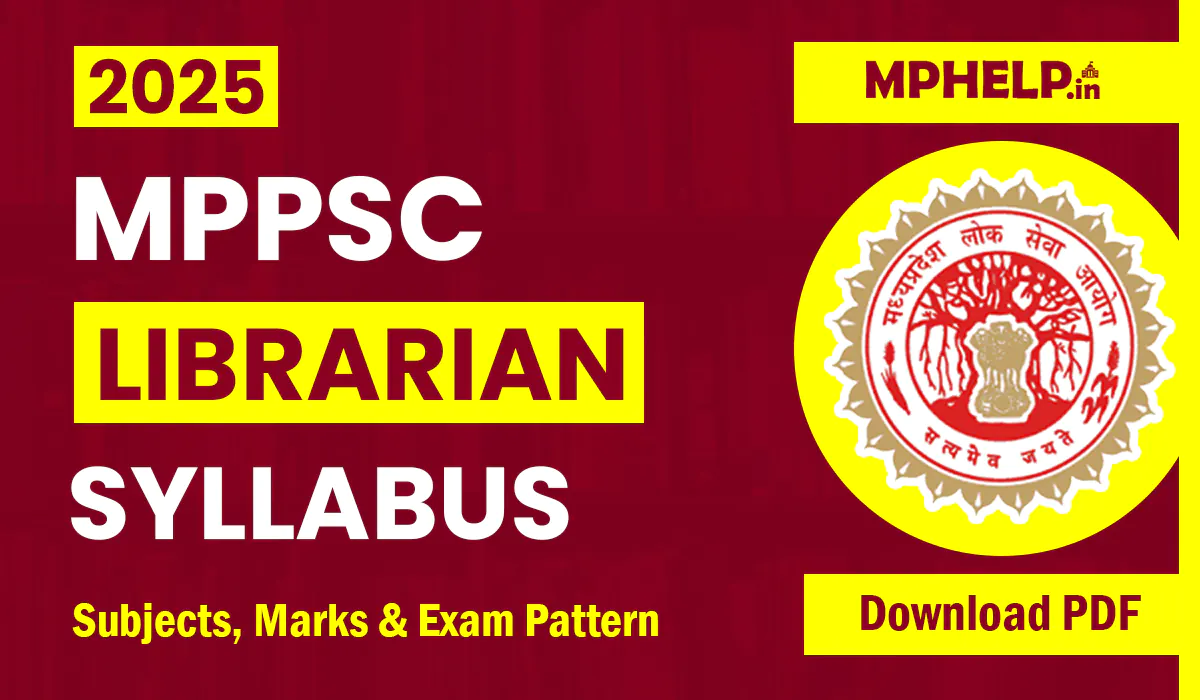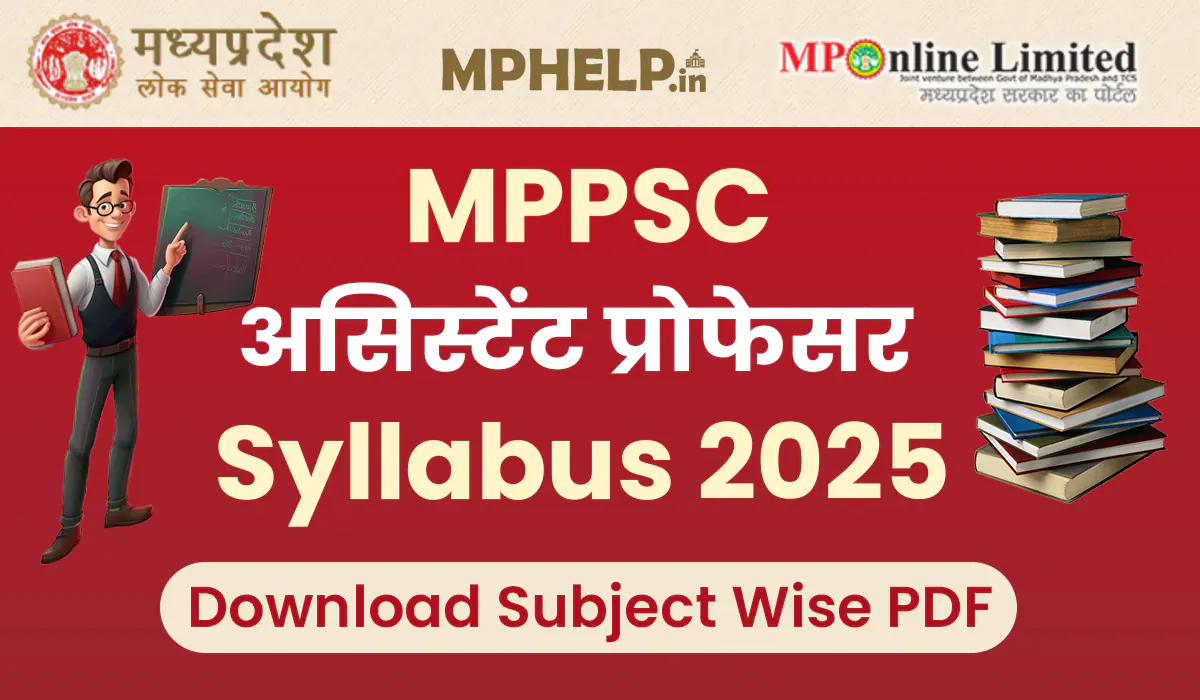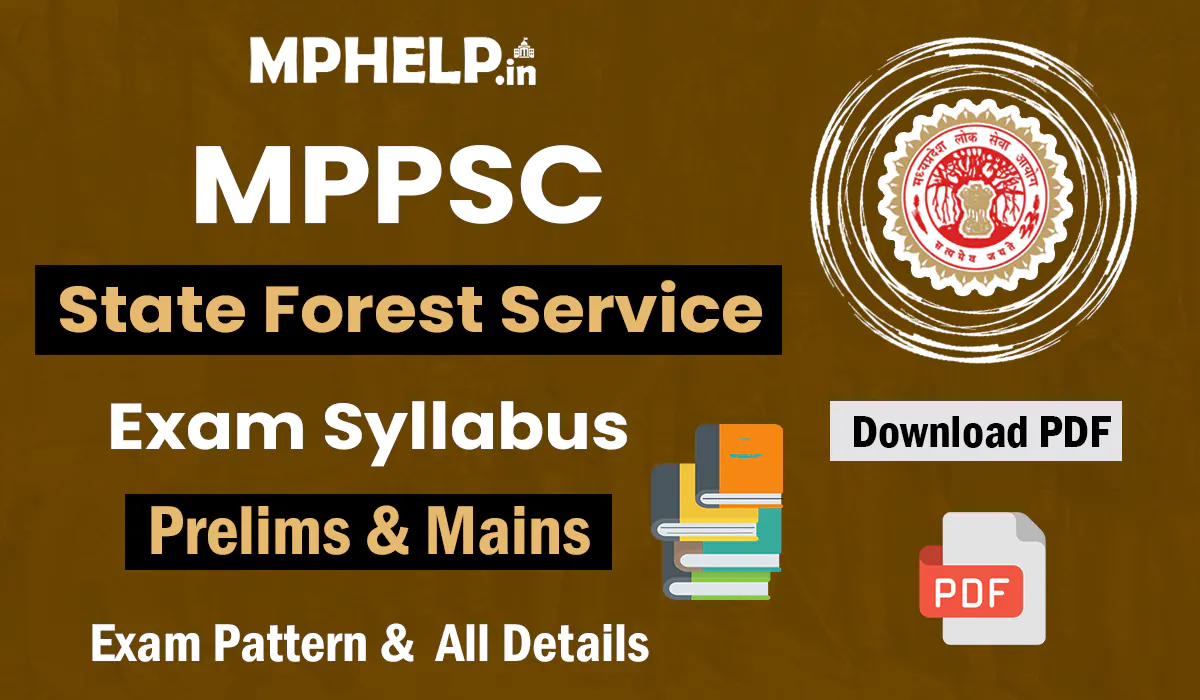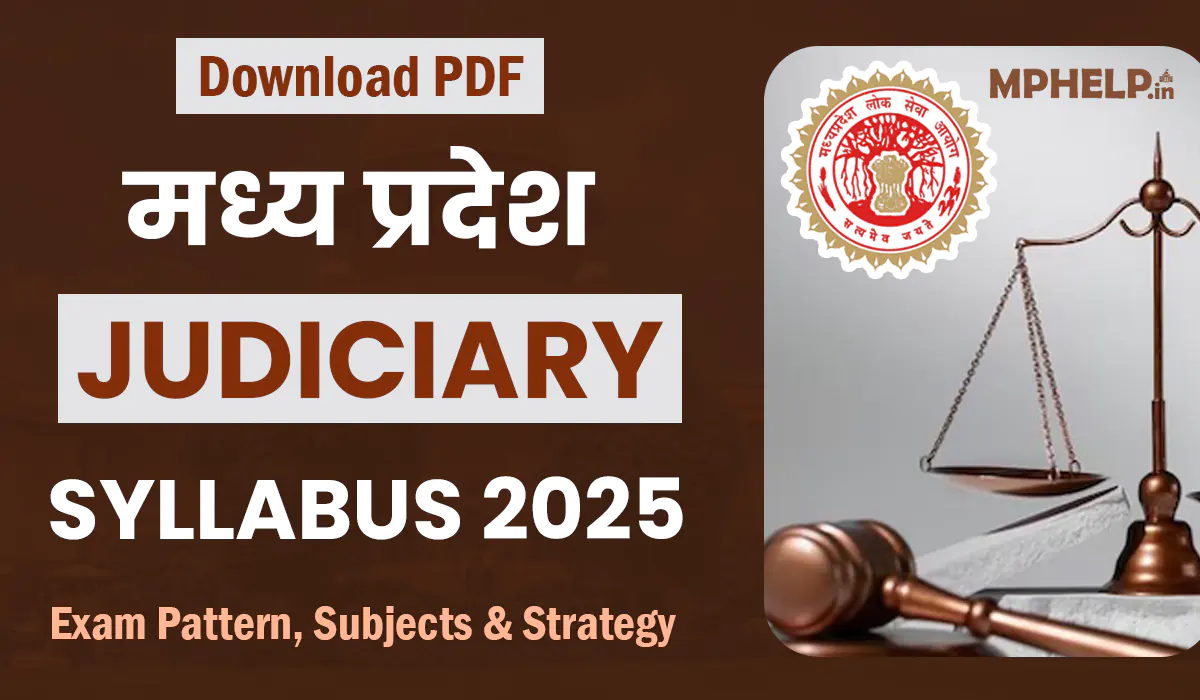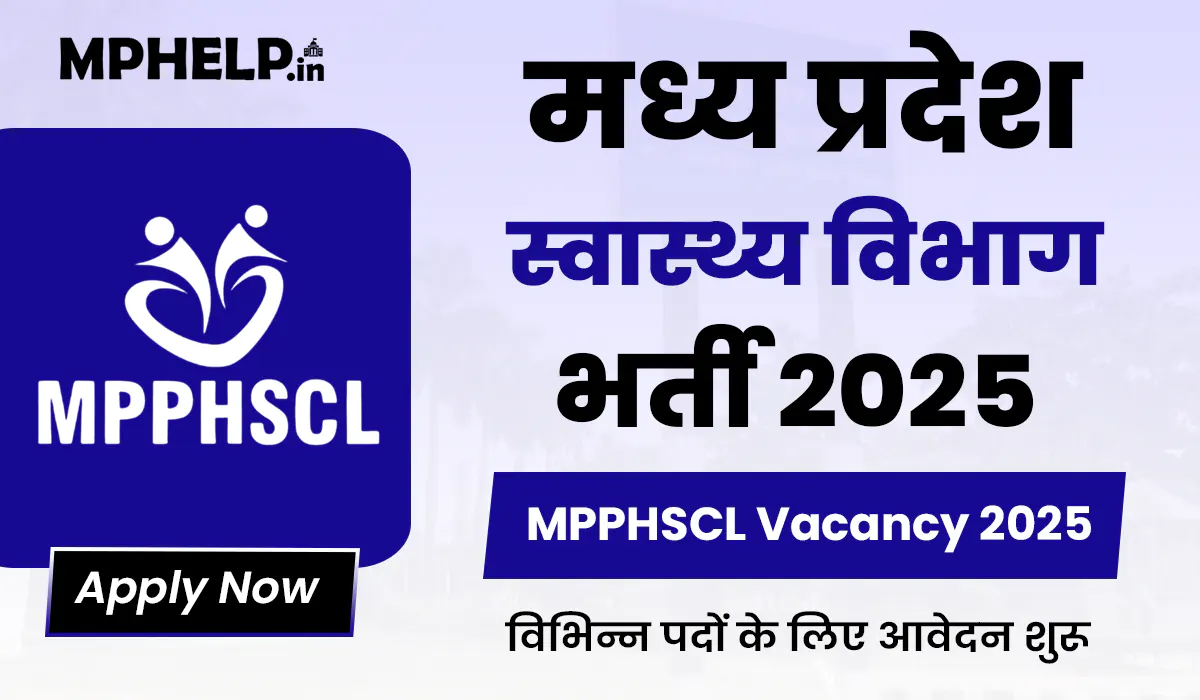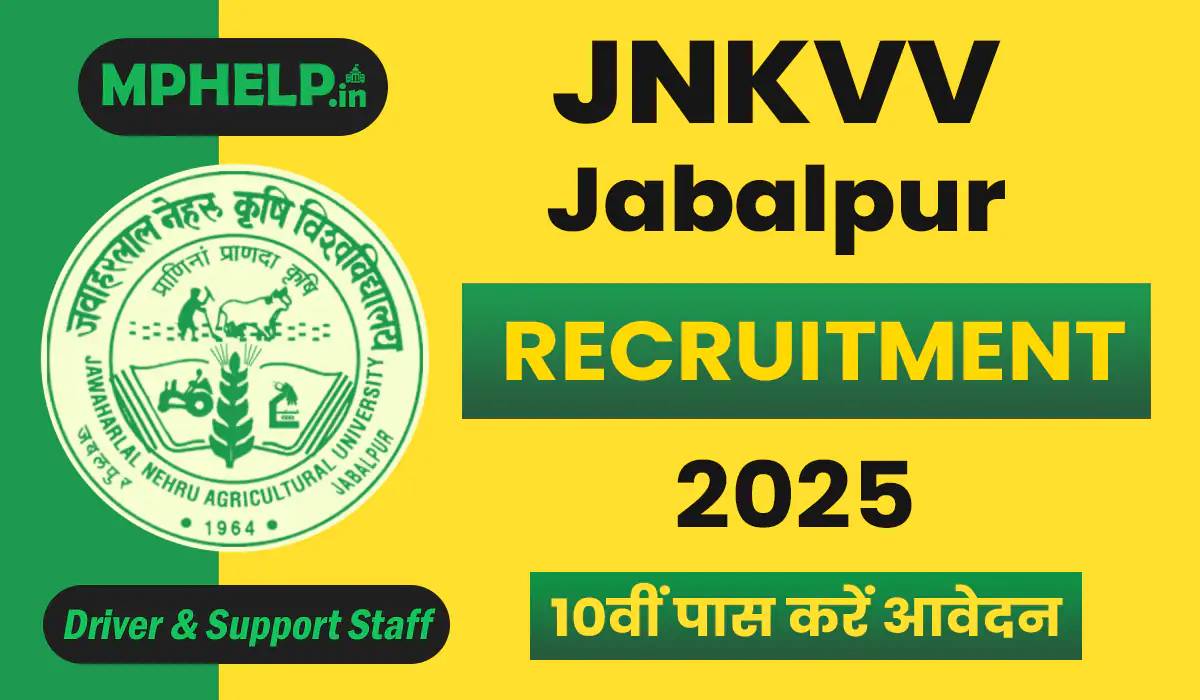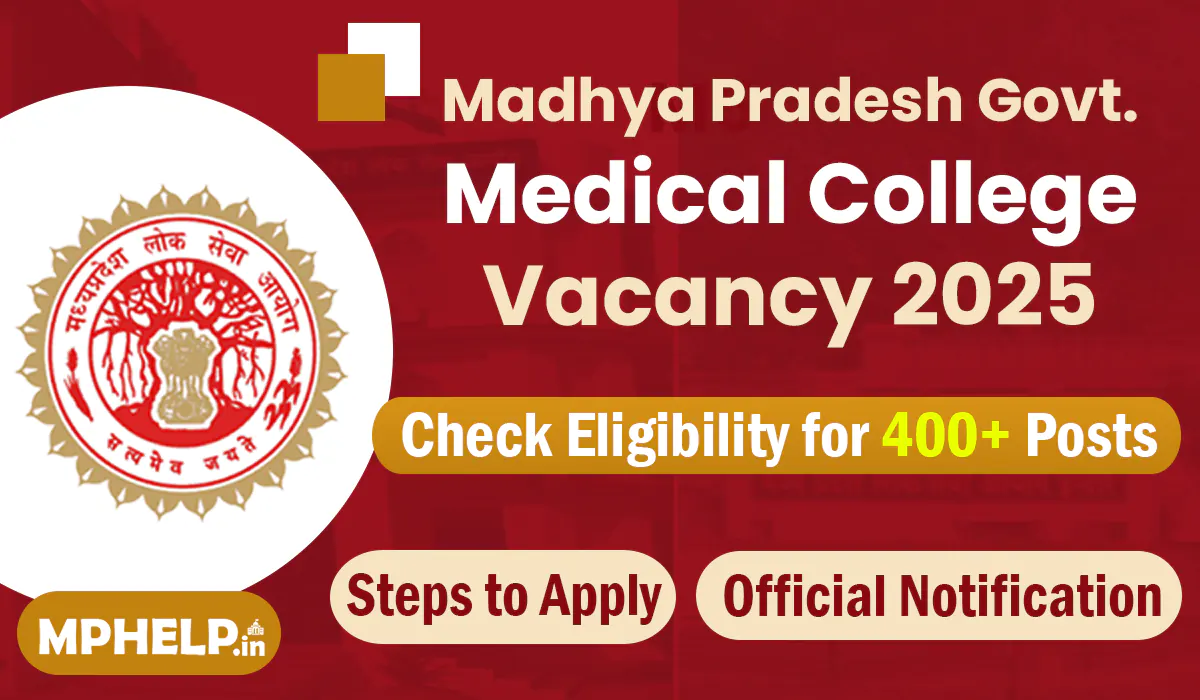MPPSC FSO Syllabus 2025: मध्य प्रदेश लोक सेवा आयोग (MPPSC) द्वारा फूड सेफ्टी ऑफिसर (FSO) भर्ती 2025 के लिए नोटिफिकेशन जारी कर दिया गया है। इस परीक्षा की तैयारी के लिए सही रणनीति और सटीक सिलेबस की जानकारी होना आवश्यक है। इसलिए MPPSC Food Safety Officer Exam की 2025 Syllabus हम लेकर आए है।
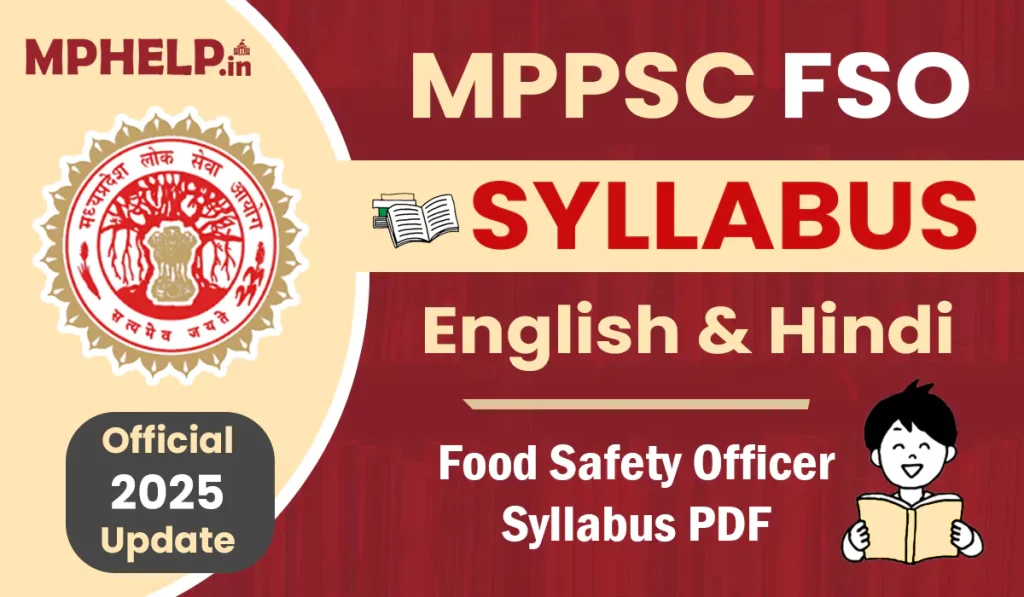
अगर आप भी MPPSC FSO बनना चाहते हैं, तो इस लेख में आपको सिलेबस, परीक्षा पैटर्न, तैयारी की रणनीति और कुछ महत्वपूर्ण बातें की पूरी जानकारी मिलेगी।
MPPSC Food Safety Officer Syllabus 2025 Details
| सिलेबस का नाम | MPPSC Food Safety Officer Syllabus 2025 |
| परीक्षा आयोजित करने वाली संस्था | Madhya Pradesh Public Service Commission (MPPSC) |
| भर्ती का नाम | MPPSC FSO Recruitment 2025 |
| चयन प्रक्रिया | Written Test + Interview |
| विषयों की संख्या (Section-A) | 5 |
| विषयों की संख्या (Section-B) | 10 |
| कुल मार्क | 500 (Section A + Section B + Interview) |
| परीक्षा मोड | Online (CBT) |
| आधिकारिक वेबसाइट | www.mppsc.mp.gov.in |
MPPSC FSO Exam Pattern 2025
MPPSC FSO परीक्षा की सही रणनीति बनाने के लिए परीक्षा पैटर्न को समझना बहुत ज़रूरी है।
| विषय | प्रश्नों की संख्या | अंक | समय |
|---|---|---|---|
| Section A: सामान्य अध्ययन | 50 | 150 | 3 घंटे (Section A+B) |
| Section B: फूड साइंस और टेक्नोलॉजी | 100 | 300 | |
| कुल योग | 150 | 450 | 3 घंटे |
| इंटरव्यू | – | 50 | – |
| कुल अंक (लिखित + इंटरव्यू) | – | 500 | – |
Important Points To Remember
- परीक्षा OMR आधारित होगी।
- प्रत्येक प्रश्न 1 अंक का होगा और कोई नकारात्मक अंकन (Negative Marking) नहीं होगा।
- परीक्षा कुल 3 घंटे की होगी।
MPPSC Food Safety Officer (FSO) Syllabus 2025
नीचे MPPSC FSO परीक्षा का संपूर्ण सिलेबस दिया गया है।
Section A: General Studies Syllabus
Unit 1: History of Madhya Pradesh
- Ancient History of Madhya Pradesh,-Prehistoric Period, Protohistoric Period and Historic Period.
- Medieval History of Madhya Pradesh
- Modern History of Madhya Pradesh
- Freedom Movement in Madhya Pradesh..
- Tribal History and Tribal Literature of. Madhya Pradesh
Unit 2: Geography of Madhya Pradesh
- Geographical location and extent of the state, major Rivers, mountains.
- Climate: Seasons, Soils, Temperature, Rainfall, Forest types and Forest
produce. - Agriculture: Major crops, Sources of irrigation, Irrigation projects!
- Thermal power projects, Non-conventional energy sources, Major Minerals.
- Population size, Growth and Literacy; Transportation,. Food processing
Industries.
Unit 3: Politics & Economy of Madhya Pradesh
- Governor, Chief Minister, Cabinet, Vidhan Sabha, Highn Court, Lokayukta.
- State Secretariat, Chief Secretary, Divisional Commissioner, Police Commissioner.
- District Administration, Urban Administration, Local Self Govemment, Parchayati Raj Institutions.
- State Election Commission, State Information Commission, State Scheduled Castès Commission, State Scheduled Tribes Commission, State Backward Classes Commission, State Commission for Women.
- Schedule Caste and Schedule Tribe Prevention of Atrocities Act, 1989; Panchayats Extension to Schedule Areas (PESA) Act, 1996; Environment Protéction Act, 1986; Madhya Pradesh Govansh Vadh Pratishedh Adhiniyam, 2004.
- Overview of the Economy of Madhya. Pradesh.
- Status of Agriculture and Rural Development in Madhya Pradesh.
- Development of Industrial and Infrastructural Framework in Madhya Pradesh.
- Status of Education, Health and Skill Development in Madhya Pradesh.
- Status of Madhya Pradesh in Sustainable Development Goals, Ease of Doing Business and Multidimensional Poverty Index.
Unit 4: Tribal Culture & Literature
- The geographical spread of tribes in Madhya Pradesh, constitutional provisions related to tribes.
- Major tribes of Madhya Pradesh and Particularly Vulnerable Tribal Groups (PVTGs). Tribal welfare programs.
- Tribal culture of Madhya Pradesh: Traditions, special arts, festivals, celebrations, language, dialects and litreture,
- Madhya Pradesh tribal’s contribution to the freedom struggle of India and iconic tribal personalities of state. Popular institutes related to tribes of Madhya Pradesh, tribal museums, publications etc.
- Folk culture and folk literature ofMadhya Pradesh.
Unit 5: Current Affairs & Technology
- Important International and National Contemporary events.
- Important Contemporary events and Major Public Welfare Schemes of Madhya Pradesh.
- Prominent personalities and Important Places of Madhya Pradesh.
- Computers, Information & Communication Technology, E-Governance.
- Basic knowledge of Artificial Intelligence (Al), Machine Learning, Cloud Computing, Data Science and Internet of Things.
Section B: Food Science and Technology
Unit-I: Introduction to Basic Food Science
- History of food & its preservation.
- Traditional Food and their importance. Role of Food fortification. Aspects of eat right challenges in India. Tribal foods of Madhya Pradesh.
- Food Constituents- Carbohydrate, Proteins, Fat, Vitamins, Minerals, Enzymes: Chemical structure, classification and functions.
- Metabolic Pathway, Digestion and Absorption; Carbohydrates, Lipids, Proteins, Vitamins, Fibres and Minerals.
- Properties of Food; Physical, Acid, Base & Buffer, Chemical, Colloids.
Unit-II: Food Microbiology
- General characteristics of micro-organism; Classification, Morphology, Physiology, Growth, Nutrition and Reproduction; Microbial growth.
- Food Poisoning and Food Borne Disease, Food Toxins. Rapid methods in detection of micro-organisms.
- Food Fermentation; Fermented Food Products and Beverages.
- Food spoilage of specific food groups (Milk and Milk products, Meat, Poultry, Fish, Cereal, Pulses, Oil, Fruits, Vegetables, Canned Food Products).
- Microbial techniques; Types of micro-organism, their morphology, culture and media preparation, SPC, TPC.
Unit-III: Food and Nutrition
- Food and Nutrition; its functions, classification and sources.
- Balance diet, Recommended Dietary Allowances (RDA), Basal energy metabolism; (BV, NPU, BMR, PER, BMI) calculations.
- Techniques for assessment of Human Nutritional status, causes and preventions of Malnutrition.
- Programme of Nutrition and Health in India (MDMP, ICDS, National Food Security Mission).
- Macro and micro nutrients deficiency diseases and their prevention.
Unit-IV: Food Preservation, Packaging and Storage
- Food preservation, Principles and its methods.
- Thermal and Non-Thermal Food Preservation Technology.
- Food Packaging; Concept of food packaging, Type of packaging, Packaging Laws and Regulations, Evaluation of food packaging materials, Packaged commodities rules.
- Novel Technologies in Food packaging and recent development.
- Food Storage; Storage structures, practices, environment and its interaction with stored product.
Unit-V: Indian Farming System
- Status of Agriculture in India, Types of traditional and modern farming systems. Components of Farming System, Farming-based Livelihood Systems-Crops and cropping systems.
- Livestock; Dairy, Piggery, Goatry, Poultry, Duckery systems.
- Horticultural Crops, Agro-forestry systems, Aquaculture, Duck/Poultry-cumFish, Dairy-cum-Fish, Piggery-cum-Fish. Small, medium and large enterprises including value chains and secondary enterprises as livelihood components for farmers.
- Commercial farming-based livelihood models by NABARD, ICAR (State Agricultural Universities and KVKs).
- Schemes and Programs by Central and State Government, Public and Private Organizations involved in promotion of farming-based livelihood opportunities.
Unit-VI: Food Safety, Quality Control, Hygiene & Standard
- Food Safety; Definition, Scope, Importance, Standard, and Factors affecting.
- Hazards and Risks; Types of hazards – Physical, Chemical, Biological hazards. Management of hazards.
- Hygiene and Sanitation in Food Service Establishments; Introduction, Sources of contamination and their control. Waste Disposal. Pest and Rodent Control, Personnel Hygiene.
- Basic concepts of Food Saftey Management, PRPs, GHPs, GMPs, SSOPs. HACCP, ISO Series, TQM.
- FSMS 22000, ISO 22000:2005, Global Food Safety Management systems.
Unit-VII: Integrated Agriculture Production Technology
- Salient feature of Agriculture and livestock of Madhya Pradesh.
- Crops production; Cereals, Pulses, Oilseeds and Millets; Horticulture Crop Production; Vegetable, Fruits, Flowers.
- Spices; Turmeric, Ginger, Coriander, Cumin, Fenugreek, Carom and Fennel.
- Animal Husbandry; Livestock Production, Goatry, Poultry, Duckery, Fisheries, Aquaculture, Apiculture, Agro forestry Systems, Concept of Sustainability.
- Post Harvest Management, Energy Management, Water Harvesting & Management, Soil Health, Crop Management, Pest Management.
Unit-VIII: Animal Product Processing
- Composition of Meat, Types of Meat, Slaughtering, Tenderization and Curing.
- Fish and Poultry processing.
- Physical, Chemical, Nutritional and Functional characteristics of Egg. Processing of Egg and Egg products.
- Composition and properties of Milk and their different processed products (Concentrated and dried, Fermented, Cream, Ice Cream, Butter, Cheese).
- Milk adulterants and its detection.
Unit-IX: Food Processing Technology
- Use of non-thermal technologies (Micro Filtration, High Pressure processing, Ultra Filtration, Reverse Osmosis), Ultra-high voltage electric fields, Cold Plasma.
- Nutraceuticals and functional foods, Junk foods.
- Method of food preservation; Thermal Processing, Pasteurization, Concentration, Canning, Dehydration, Freezing, Fermentation, Irradiation and Food additives.
- Aseptic preservation, Hurdle Technology, Hydrostatic Pressure Technology, Microwave Processing.
- Innovative Thermal Technologies (Ohmic heating, Dielectric heating, Infrared and Induction heating) in food processing.
Unit-X: Food Laws, Regulation, Certification and Development Schemes
- National and International Food Laws and Standards, Food Regulatory Regime, FSSAI, Codex Alimentarius Commission, Global Scenario CAC.
- Food Safety and Standards Act FSSAI Rules-2006, Food Adulteration, Misbranding, Common Adulterants in Foods, Duties and Responsibilities of Food Safety Authorities.
- Certification: Procedure, Auditing, Certifying and Accrediting Bodies. Bureau of Indian Standards (BIS), AGMARK, Weights and Measures Act, Principle, Implementation, Documentation, Types of records.
- Organic Food and Genetically Modified Food.
- Food institutes; CFTRI, NIFTEM, ICAR, ICMR, DFRL.
तो इस सिलैबस का PDF भी हमने आपके लिए रैडि किया है। आप इस लिंक से MPPSC Food Safety Officer Syllabus 2025 PDF Download कर सकते है। ये सिलैबस Hindi और English दोनों भाषाओं में हैं।
Preparation Strategy & Tips
मेरे दोस्त नीरज इस परीक्षा को दो साल पहले पास करके आज एक सफल Food Safety Officer हैं। उन्होंने अपनी तैयारी की पूरी यात्रा साझा की। उन्होंने कहा की –
“सिर्फ सिलेबस याद करने से सफलता नहीं मिलेगी, आपको यह समझना होगा कि इन टॉपिक्स का असली जीवन में क्या महत्व है।”
अपने अध्ययन समय की सही योजना बनाएं
- 2 हफ्ते – रसायन विज्ञान और सूक्ष्मजीवविज्ञान (मुख्य विज्ञान विषयों) पर ध्यान दें।
- 1 हफ्ता – मध्य प्रदेश के विषय (इतिहास, भूगोल, अर्थव्यवस्था) को कवर करें।
- रोटेशन तकनीक अपनाएं – अपनी ताकत के अनुसार विषयों को रोटेशन करके पढ़ें।
मॉक टेस्ट का अभ्यास करें
- हर सप्ताह 150 MCQs को 2.5 घंटे में हल करें।
- यह आपको 3 घंटे की परीक्षा के लिए समय प्रबंधन सिखाएगा।
- पिछले वर्षों के प्रश्नपत्र डाउनलोड करें: mppsc.mp.gov.in
मध्य प्रदेश के खाद्य सुरक्षा मुद्दों को समझें
- खाद्य पदार्थ मिलावट मामले (जैसे 2024 का भोपाल केस) परीक्षा में पूछे जा सकते हैं।
- स्थानीय समाचार पत्र पढ़ें और अपडेट रहें।
विज़ुअल एड्स का उपयोग करें
- सिलेबस चार्ट बनाएं और इसे अपनी दीवार पर चिपकाएं।
- महत्वपूर्ण टॉपिक्स हाइलाइट करें, ताकि पढ़ाई सही दिशा में हो।
फूड सेफ्टी कानूनों में महारत हासिल करें
- खाद्य सुरक्षा और मानक अधिनियम (FSSAI) को गहराई से पढ़ें।
- इसके महत्वपूर्ण सेक्शंस को याद करें – यह हाई स्कोरिंग टॉपिक है।
करंट अफेयर्स पर नज़र रखें
- MP की ताज़ा खबरें पढ़ें – यह आपके निबंध का विषय भी हो सकता है!
- MP न्यूज ऐप्स और PIB अपडेट्स से जुड़े रहें।
अपने दिमाग पर ज्यादा बोझ न डालें
- एक साथ पूरे 14 विषयों को रटने की कोशिश न करें।
- हर हफ्ते 3-4 टॉपिक्स को अच्छे से समझें और फिर आगे बढ़ें।
ग्रुप स्टडी का फायदा उठाएं
- दोस्तों के साथ MP के इतिहास, संस्कृति और कृषि पर चर्चा करें।
- विषयों पर बातचीत करने से वे जल्दी याद रहते हैं।
स्मार्ट प्लानिंग + लगातार अभ्यास करोगे तो सफलता मिलेगी ही मिलेगी!
आज ही अपनी तैयारी शुरू करें और टॉप करें MP FSO 2025 Syllabus के साथ!
